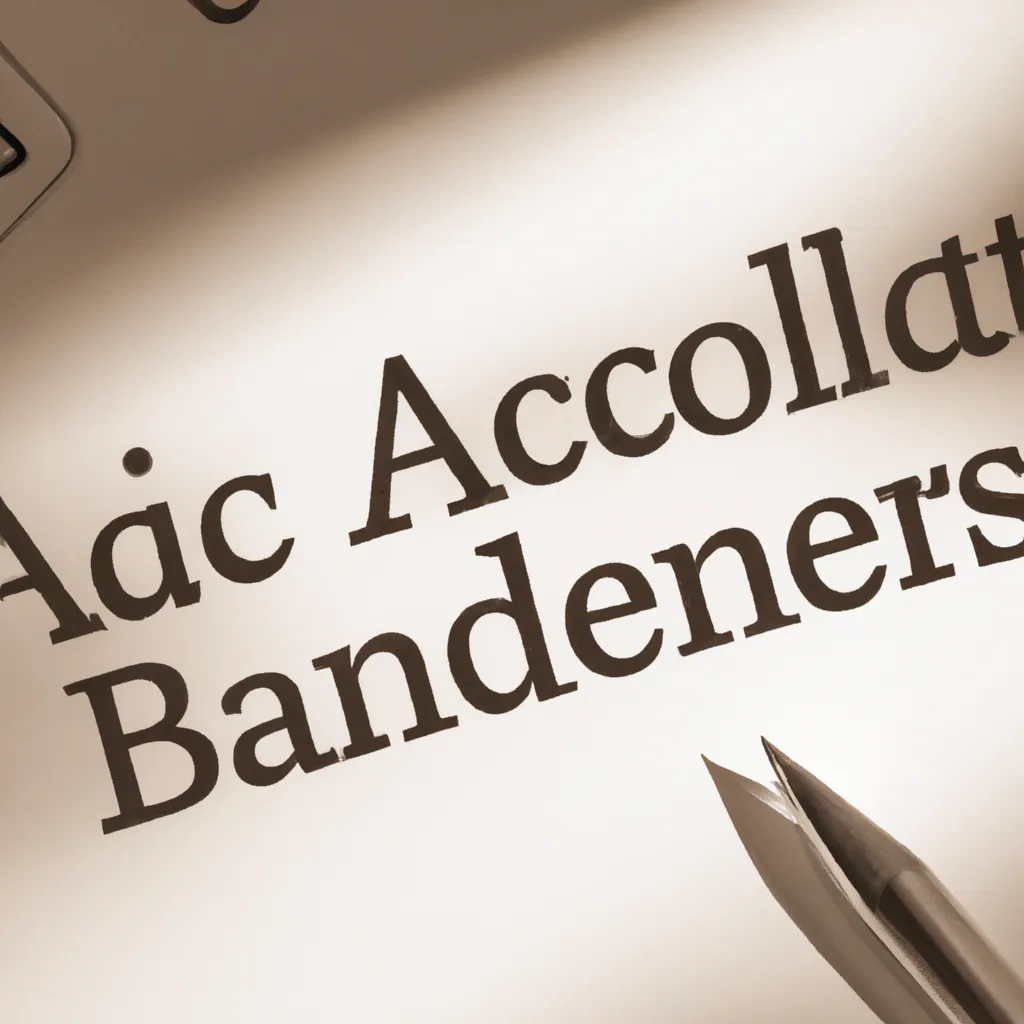Are you looking for efficient accounts payable solutions in Bradford. Look no further, because Expert Accounting has the perfect solution for your accounting needs. With knowledge and expertise in the field, Expert Accounting offers top-notch accounts payable solutions in Bradford. By using their services, you can streamline your business operations and ensure timely payments to your vendors.
Find out how Expert Accounting can help your business by implementing innovative and efficient accounts payable solutions. Increase your productivity and save time and money with their professional services. Want to learn more. Contact Expert Accounting now and take your accounting process to the next level.
Understanding accounts payable
For any business, the financial aspect is crucial to keep track of in order to operate smoothly. One of the key components of financial management is accounts payable, which plays a critical role in a company's operations and can significantly impact its financial health. In this section, we'll dive into the definition of accounts payable and its importance for your business.
What is accounts payable?
Accounts payable refers to the outstanding debts or payments that a business owes to its suppliers or vendors for goods or services it has received. It is a liability that needs to be paid within a specified time frame, typically within 30-90 days. These payments can include anything from office supplies and inventory to utility bills and business-related expenses. Essentially, any time a business receives a good or service without making an immediate payment, it becomes a part of their accounts payable.
For example, suppose bradford's bakery ordered a new supply of flour from a local supplier. The supplier sends a shipment of flour to the bakery but issues an invoice to be paid within 45 days. In this case, the flour becomes part of bradford's bakery's accounts payable until they pay the supplier's invoice.
Why accounts payable matters
controls business cash flow:The management of accounts payable is crucial because it directly affects a company's cash flow. If not effectively managed, it can lead to cash flow shortages, which can lead to missed payments and late fees, ultimately impacting the company's financial health.
The timely payment of accounts payable is also essential to maintain good relationships with suppliers and avoid any disruptions in the supply chain.
provides an accurate financial picture:Accounts payable is an integral part of a company's financial statements and provides a realistic view of its financial health. It is recorded as a liability in the balance sheet and as an expense in the income statement. Timely and accurate recording of accounts payable gives a clear picture of the company's financial standing and helps with budgeting and decision-making.
The benefits of using accrual basis accounting for accounts payable
Accrual basis accounting is a method of accounting that records revenues and expenses when they are earned or incurred, regardless of when the payment is made. This means that under accrual basis accounting, an expense is recorded when an invoice is received, even if the payment is not made immediately. This method provides a more accurate and up-to-date view of a company's financial position.
One of the main benefits of using accrual basis accounting for accounts payable is that it helps in better cash flow management. It ensures that expenses are reflected in the correct period, avoiding any confusion around liabilities and expenses.
In addition, accrual basis accounting also helps with more accurate budgeting and forecasting, as it includes all expenses regardless of when they are paid. This gives a more precise understanding of the company's financial obligations and can help in making more informed financial decisions.
How proper accounts payable management can improve cash flow
Accounts payable management is a crucial aspect of financial management and can positively impact a company's cash flow in the following ways:
timely payments:By managing accounts payable effectively, businesses can ensure timely payment of their debts. This not only avoids any late fees and penalties but also helps maintain good relationships with suppliers, which can potentially lead to discounts or better payment terms in the future.
discount opportunities:Some suppliers may offer discounts for early payment, which can save a business money in the long run. By effectively managing accounts payable, businesses can take advantage of these discounts and improve their cash flow in the process.
cash flow forecasting:By tracking accounts payable closely, businesses can better forecast their cash flow and plan accordingly. This can help with managing expenses and avoiding any cash flow shortages that may arise.
The connection between accounts payable and accounts receivable
Accounts payable and accounts receivable are two sides of the same coin. While accounts payable refers to the money a business owes, accounts receivable is the money a business is owed by its customers. Both these aspects of financial management impact the company's cash flow, and it is essential to manage them effectively.
In simple terms, effective management of accounts payable can lead to improved cash flow, which, in turn, can help with the timely payment of accounts receivable. This means that by managing accounts payable well, a business can maintain a steady flow of income, leading to better financial health overall.
Understanding accounts payable is essential for any business owner or financial manager. Proper management of accounts payable can lead to improved cash flow, accurate financial statements, and better financial decision-making. By using accrual basis accounting and monitoring accounts payable closely, businesses can ensure smooth financial operations and maintain good relationships with suppliers and vendors. Remember, effective management of accounts payable ultimately helps in achieving overall financial stability for your business.

Effective management of accounts payable
In any business, managing accounts payable is a vital task that requires careful attention and efficient processes. For companies in bradford, a city known for its vibrant business community, managing accounts payable effectively is essential for financial success. In this article, we will discuss the best practices for managing accounts payable in bradford, the key components of an efficient accounts payable process, and the automation tools and software available to streamline these tasks. We will also explore some common challenges faced by businesses in managing accounts payable and provide tips on how to overcome them.
Best practices for managing accounts payable in bradford
Accounts payable management involves overseeing outgoing payments to suppliers and vendors. Here are some best practices for managing accounts payable in bradford:
- establish clear guidelines and processes: It is crucial to have a documented and well-defined accounts payable process in place. This includes setting guidelines for budget approval, payment schedules, and payment methods. Having clear processes ensures consistency and accuracy in managing accounts payable.
- implement an accrual basis of accounting: Using the accrual basis of accounting rather than the cash basis can provide a more accurate picture of a company's financial health. With accrual accounting, expenses are recorded when they are incurred, not when they are paid. This allows for better tracking of accounts payable and can help with budgeting and forecasting.
- use a centralized accounts payable system: It is beneficial to have a centralized system to manage accounts payable, such as accounting software or an enterprise resource planning (erp) system. This allows for easier tracking and monitoring of expenses, and also provides a more efficient and accurate method of data entry.
- implement a strict approval process: Companies should have a clear approval process in place for all expenses, from purchase requests to invoice approvals. This ensures that all payments are valid and within budget before they are processed.
- regularly reconcile accounts payable: It is essential to regularly reconcile accounts payable to ensure that all invoices and payments are accurate and up-to-date. This process can help identify any discrepancies or errors that need to be addressed.
Key components of an efficient accounts payable process
An efficient accounts payable process involves several key components that work together to ensure timely and accurate payments. These components include:
- purchase order: This is a document that outlines the details of a purchase, such as the items or services ordered, quantities, and cost. A purchase order is used to help keep track of expenses and ensure that they are within budget.
- invoice: An invoice is a document sent by a supplier or vendor to request payment for goods or services provided. It typically includes the date of the purchase, item or service description, price, and terms.
- receipt of goods/services: This document confirms that the goods or services have been received as ordered and are satisfactory. It is used to verify the accuracy of the invoice and the amount due for payment.
- payment approval: This is the process of reviewing and approving payments before they are processed. This step helps to ensure that all payments are valid and within budget.
- payment processing: Once payments are approved, they are processed for payment. This can involve issuing a check, making an online payment, or setting up automated payments.
- reconciliation: Finally, accounts payable must be reconciled regularly to ensure that all payments and invoices are accurate and up-to-date.
Automation tools and software to streamline accounts payable tasks
The use of automation tools and software can greatly improve the efficiency and accuracy of managing accounts payable. Some options to consider include:
- accounting software: Many businesses use accounting software to manage their finances, including accounts payable. This software can automate tasks such as data entry, invoice retrieval and matching, and payment processing, saving time and reducing errors.
- enterprise resource planning (erp) software: Erp software integrates various business processes, including accounts payable, into one system. This allows for better data management and improved efficiency.
- online payment systems: Using online payment systems, such as ach payments or e-checks, can speed up the payment process and reduce the likelihood of errors.
- electronic data interchange (edi): Edi allows for the electronic exchange of documents between businesses, making the accounts payable process more efficient and reducing the risk of data entry errors.
Common challenges and how to overcome them in accounts payable
Despite the best practices and tools available, businesses may still face challenges in managing accounts payable. Some common challenges include:
- delayed invoice processing: If invoices are not processed in a timely manner, it can lead to late payments and potential damage to supplier relationships. To overcome this challenge, businesses can implement an approval process and prioritize timely invoice processing.
- data entry errors: Manual data entry is prone to errors, which can lead to incorrect payments and discrepancies in accounting records. The use of automation tools and software can help reduce these errors.
- inefficient communication with suppliers: Poor communication with suppliers can lead to delayed payments, misunderstandings, and potential problems with the supply chain. To overcome this, businesses can establish efficient communication processes and maintain good relationships with suppliers.
- missing or incorrect documentation: Missing or incorrect documentation can lead to confusion and errors in accounts payable. To overcome this challenge, businesses should ensure that all documentation is complete, accurate, and easily accessible.
- difficulty in tracking expenses: Without proper tracking, businesses may face difficulty in managing cash flow and staying within budget. Using an accrual basis of accounting and regularly reconciling accounts payable can help track expenses more accurately.
Effective management of accounts payable is crucial for the financial success of any business. By following best practices, implementing efficient processes, and utilizing automation tools, businesses in bradford can streamline their accounts payable tasks and overcome common challenges. This allows for a more accurate and timely tracking of expenses, better budgeting and forecasting, and improved overall financial management.

Optimizing accounts payable in your accounting period
accounts payable Plays a crucial role in the financial management of any business. It refers to the money that a company owes to its suppliers, employees, and other creditors for goods and services received. In simpler terms, accounts payable is the amount of money that a company is required to pay to its suppliers and other creditors.
Proper management of accounts payable is essential for the financial health of a company. It not only impacts a company's cash flow but also affects its profitability. In this article, we will discuss the importance of accounts payable in your accounting period and provide some tips for optimizing your accounts payable process.
Why your accounting period is crucial for accounts payable management
Your accounting period Refers to the amount of time for which your company's financial transactions are recorded for reporting and analysis purposes. It could be monthly, quarterly, or yearly, depending on your company's accounting practices. The accounting period is crucial for managing your accounts payable for several reasons:
- accurate and timely recording: An accounting period allows you to record and track all your financial transactions efficiently. This is particularly important for accounts payable, as it ensures that all incoming bills and invoices are recorded accurately and in a timely fashion.
- better cash flow management: By having a designated accounting period, you can keep track of your company's upcoming financial obligations, including accounts payable. This helps you plan and manage your cash flow more effectively.
- identifying and correcting errors: The accounting period allows you to identify any discrepancies or errors in your accounts payable. By doing regular checks and reconciliations, you can correct any mistakes before they become bigger issues.
Tips for maintaining accurate and organized accounts payable records
Accurate and organized records are crucial for managing accounts payable. Not only do they help you track your company's financial obligations, but they also simplify end-of-period closing processes, tax preparations, and financial reporting. Here are some tips to ensure your records are in order:
- implement a standardized process: Establish a clear and consistent process for recording and tracking your accounts payable. This will help you stay organized and avoid any confusion or errors.
- review and reconcile monthly: Make it a habit to review your accounts payable records and reconcile them with supplier statements on a monthly basis. This will help identify any discrepancies or errors and ensure accurate records.
- utilize accounting software: Consider investing in accounting software that can help you manage your accounts payable more efficiently. These tools can automate invoice processing, streamline payments, and provide real-time reporting.
- save documentation: Keep all documentation related to your accounts payable, such as invoices, receipts, and purchase orders, organized and accessible. This will help you verify and validate your records if needed.
How to handle accounts payable during month-end and year-end closing
Month-end and year-end closings are critical periods for any business. It's important to have a clear understanding of your accounts payable Process during these times to ensure accurate and timely reporting. Here are some steps you can follow:
- ensure all invoices are recorded: Before closing your accounting period, make sure all invoices have been recorded, regardless of their payment status. This will help you provide a comprehensive overview of your company's financial obligations.
- review and reconcile records: As mentioned earlier, it's crucial to review and reconcile your accounts payable records at the end of each period. This will help identify any discrepancies and correct them before final reporting.
- make necessary adjustments: If you identify any errors during the closing process, make necessary adjustments and record them in your books accordingly.
- prepare for tax filing: During year-end closing, it's essential to review and update your accounts payable records to ensure accurate tax filings.
The role of accounts payable in financial reporting and analysis
The proper management of accounts payable is crucial for accurate and reliable financial reporting and analysis. Here are a few key ways that accounts payable Impacts these processes:
- balance sheet: Accounts payable are included in a company's balance sheet under current liabilities. This gives investors and creditors insight into a company's financial obligations and its ability to manage its cash flow.
- income statement: Accounts payable are recorded as expenses on the income statement, providing a more accurate representation of a company's financial performance.
- cash flow statement: Accounts payable also have a significant impact on a company's cash flow statement. By properly managing and tracking your accounts payable, you can ensure your company's cash flow remains healthy.
- financial analysis: By analyzing your accounts payable turnover ratio, you can gain insights into your company's efficiency in managing its accounts payable. This can also help identify any potential cash flow issues that need to be addressed.
Efficient management of accounts payable Is crucial for the financial stability and success of any business. By understanding the importance of your accounting period, implementing a standardized process, and utilizing technology, you can optimize your accounts payable and ensure accurate and timely financial reporting. Remember to review and reconcile your records regularly, especially during month-end and year-end closing to identify any discrepancies and make necessary adjustments. With proper accounts payable management, you can keep your company's cash flow healthy and make informed financial decisions for the future.


